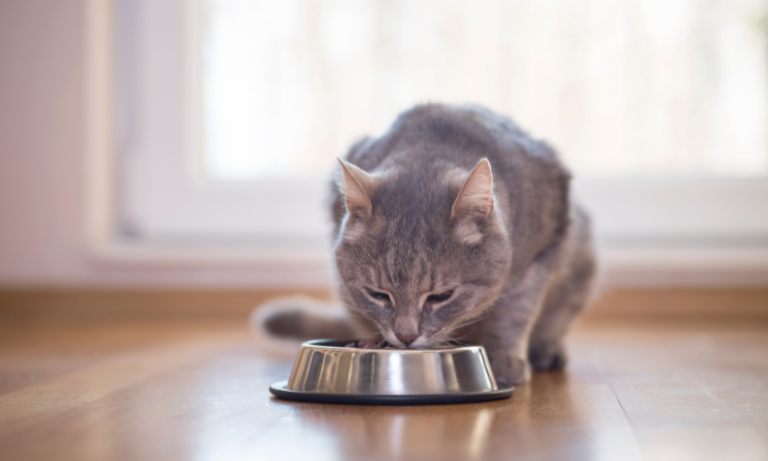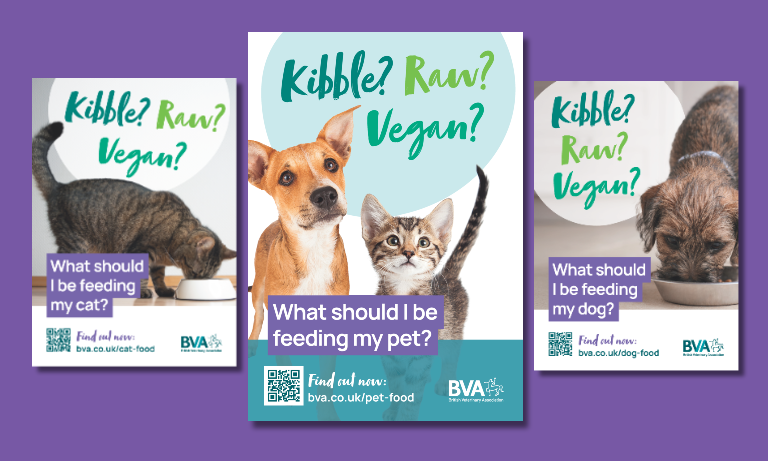Diet choices for cats and dogs
What's the issue?
Pet owners are increasingly opting for non-traditional diets for their cats and dogs. Our latest BVA Voice of the Veterinary Profession research showed 94% of companion animal vets have clients who feed a raw diet, 42% have clients who feed meat-free diets and 29% have clients who feed insect-protein in place of meat.
All animals must be fed a diet which meets their nutritional needs, to be protected from any pain, suffering, injury or disease that may result from being fed an inappropriate diet. However, with a range of factors to consider, including nutrition, safety and sustainability, choosing the most suitable pet food can be complex. It can also be difficult to access clear, scientifically sound information, making these important decisions around diet choice even more challenging.
What's our view?
Our policy position does not attempt to determine the ‘best’ diet for individual pets but rather focuses on supporting pet owners to ensure they are meeting their pets’ nutritional needs whilst balancing factors such as sustainability and production animal welfare. The issues around pet food are complex, and with so much information available, the veterinary profession could play an important role in supporting pet owners.
One of the key issues in these conversations is the lack of long-term, evidence-based research. So, we’re urging vets to speak with pet owners about their chosen diet they, and record nutritional histories and any resulting issues on their practice systems. To be the ‘trusted voice’ in these conversations, it’s vital that vets are well educated on the topic, ask the right questions, and record as much data as possible to help understand the long-term impact of some of these newer diets.

In our position, we make calls on veterinary professionals and organisations, the pet food industry, Government and animal owners to improve understanding of all diet types. Our recommendations include calls for:
- Veterinary organisations to create accessible resources to help pet owners make decisions on diets that are suitable for their pet
- Communications campaigns to supports pet owners to understand the importance of feeding animals to maintain a healthy weight
- Pet food companies to provide additional information on UK pet food labels, to improve access to information.
- A roundtable on how to create an adverse reaction reporting system for pet diets in the UK.
- Improved awareness of the complexities around diet choice in a one health context.
- Clear explanations on what animal by-products are, including their role in sustainable food systems.
- Pet food companies to work with suppliers to ensure they can trace welfare standards for animal-based ingredients in their products and communicate this to pet owners.
- APHA/Government agencies to improve labelling and traceability of animal by-products.
- Greater emphasis on the importance of nutrition in day one competencies for veterinary surgeons and veterinary nurses, and improve awareness of the need for considerate communication on this topic with animal owners.
- Veterinary professionals to routinely and systematically record nutritional histories on their Practice Management Systems, ideally in line with the WSAVA Diet History Form.
View our policy documents
New pet food diet FAQs
We've launched new online pet food diet FAQs – designed to to help pet owners choose healthy, sustainable diets for their cats and dogs.
To support members with this new FAQ, we’ve created a set of exclusive member-only resources to help you promote this new tool to your clients.

